
Publisher:
Bonnie King
CONTACT:
Newsroom@Salem-news.com
Advertising:
Adsales@Salem-news.com

~Truth~
~Justice~
~Peace~
TJP
Jul-26-2022 13:33


 TweetFollow @OregonNews
TweetFollow @OregonNews
The Climate Front: People Who Live There. The Battle for Bristol Bay
Robert Lundahl special to Salem-News.comYou can't tell the fish “I'm tired, wait, I'll be back in four hours.”
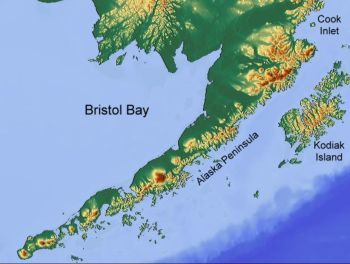 Bristol Bay is the easternmost arm of the Bering Sea, in Southwest Alaska. According to the EPA, Bristol Bay is home to the world's largest salmon run. Image: Wikipedia |
(LOS ANGELES, Calif.) - It was nearly two years ago, in November 2020, awaiting the Army Corps of Engineers’ decision related to the permitting of Alaska’s proposed Pebble Mine, that I interviewed MJ Jackson.
Michael is a commercial fisherman, who had built a life on the waters of Bristol Bay, seeking that holy messenger of the currents, deep red–fleshed Sockeye Salmon, to grace the tables of the Bill Gates’ and Eric Trumps and millions of us on a night out for dinner or a party at home, family meals included; it is a staple to local tribes and Alaskans as a whole.
And there’s a lot of money in it.
The Pebble Mine fight had been going on for some 15 years. Tribes and fishermen alike have opposed the proposal for the mine upstream of Bristol Bay, fearing it would harm the wild sockeye at the heart of the area's identity and subsistence.
For MJ and his sons, also now in the business, it’s a good living. Arguably “sustainable,” healthy and lucrative, it amounts to a healthy lobbying force politically, too, but still the outcomes are uncertain.
At that heart stoppingly tense time for the locals, The U.S. Army Corps of Engineers eventually denied their permit for the massive Pebble Mine project.
The Corps said in a statement that it had determined that the plan "does not comply with Clean Water Act guidelines" and it had concluded "the proposed project is contrary to the public interest."
But the coffin had not been sealed on Pebble Mine Partners. Flush with investment dollars from abroad even the environmental bad–guys, the Australian firm Rio Tinto had thought best to decline.
In the face of indigenous opposition, the concern had been that permanent protections would be necessary to eliminate future worries.
So when only two weeks ago, the similarly required permitting by the EPA would come up for public comment, another agency would have to sign on for the project to succeed.
In late May, the U.S. Environmental Protection Agency announced it wants to veto development of the Pebble Mine, which they said would result in unacceptable loss of salmon habitat, both at the site and further downstream.
Under the authority of the Clean Water Act, the agency proposes to prohibit the discharge of mining materials in the waters and wetlands at the Pebble site. That would make it impossible to extract minerals there.
According to the proposed development plan, the EPA notes, the mine would result in the loss of almost 100 miles of stream habitat, 8.5 miles of salmon habitat, and 2,113 acres of wetlands and waters at the mine site.
MJ and I each draw upon similar experiences, in my case, regarding the removal of the Elwha River Dams in Washington State, built with similar enthusiasm from industry, 100 years before. I had made a film about it, Unconquering the Last Frontier, available through Bullfrog Films.
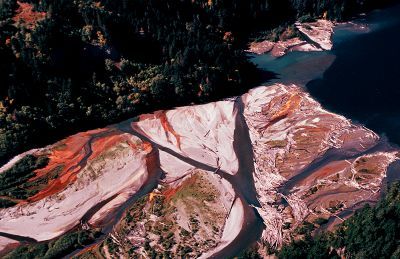 Algae bloom at the head of Lake Mills, Elwha River pre dam removal.1 |
As on the Elwha and at Bristol Bay, one industry threatens another. The winnowing of logging buffers on the Olympic Peninsula helped degrade salmon habitat on a number of rivers, negatively impacting both tourism and federal and state salmon recovery efforts.
Here was a "power play" and Pebble Mine development carried a distinct ring of familiarity.
EXCLUSIVE INTERVIEW:
Robert Lundahl: Can you introduce yourself and tell me what your profession has been and when you started?
MJ Jackson: My profession is an Alaska commercial fisherman and my name is Michael Jackson. I've been fishing up in Alaska for 41 years, and I've fished in all sorts of different fisheries, but currently the only fishery I'm involved in is the Bristol Bay drift fishery.
Robert Lundahl: And what was it like when you first got to Alaska? What were your impressions?
MJ Jackson: When I first got to Alaska it was as wild as I'd hoped it would be because I was as wild as I was. I was 18 years old and knew no limits and that's what Alaska is good at is letting you find your limits.
I did whatever I wanted whenever I wanted however often I wanted and learned a lot along the way.
Robert Lundahl: Well that must have been entertaining for you and your friends and family, or everybody involved...
Michael Jackson: ...Yeah but I'm not alone. I think I'm one of whoever goes up there, Alaska is the land of misfits and I fit right in as a misfit.
Robert Lundahl: And you started fishing, which a lot of people do and how did that happen?
Michael Jackson: I started fishing because where I went to school in Tacoma, Washington, there were a number of families that were fishing families and they were friends and they would go up and make money during the summers and come back, and I wanted to do that after I graduated, I wanted to make some money.
I had a climbing trip in mind that I wanted to pay for so I went up and once I did it I, it wasn't for the money anymore. I mean you can fish to make a living but I found out right away that I was going to fish to make a life.
Robert Lundahl: What did that mean to you? What do you mean by making a life?
Michael Jackson: On the last frontier I think anytime you can be involved in passion in your life you're going to live and you're going to be the best, you if you have passion involved with what you do. You're going to push the limits on what you do – you're going to be – you're going to be actively engaged and involved 24/7/365 and that's what I did.
I was young, I was healthy, I was surrounded by young like-minded healthy people, and for me it was an adventure as much as it was a way to make money, and I never ever felt like I was going to work.
I felt like I was going on an adventure and coming back with money, and I was doing it with friends and meeting new friends, and it's no different now – I mean there's different financial obligations, different limitations on what the body can do.
Things have changed but it's still an absolutely amazing place to go. There's just there's just nothing like it. Nothing.
Robert Lundahl: Tell me about Bristol Bay. Tell me about the fishery...
Michael Jackson: Have you ever been to Burning Man?
Robert Lundahl: No I haven't, but everybody I know has, it's just that I was working while they were getting high and doing what they did...
Michael Jackson: What Bristol Bay fishery to me is, never having been to Burning Man but having seen films and talking to people, Bristol Bay is to fishing as Burning Man is to a festival.
Everything is amplified to a level of craziness that is almost incomprehensible – the hours are insane, the weather is insane, the type of conditions you're putting... working around different boats in close quarters is crazy but it somehow all works .
Through that whole frenetic maelstrom it all just kind of filters out and works, and that's what it's like.
There is no two days the same in Bristol Bay and I've done lots of fisheries all over and really, Bristol Bay is – it's one off for just the extremes of what it is. Volumes of fish that come in a minute! You'll get 10,000 pounds of fish in one minute in your net.
Where else does that happen?
You'll have 10 boats within 100 feet of you bumping into you trying to make the same set, get your net in the water, where else does that happen? But it all works for some reason it all works. It's Mother Nature at its absolute finest and it's human nature at its absolute worst.
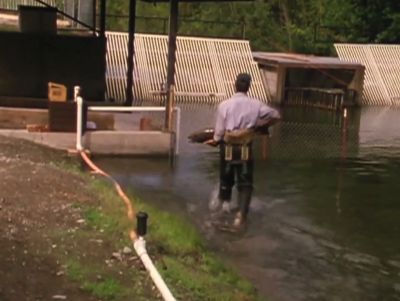 "They proceed to die like flies." Elwha Kings returning to the state |
Robert Lundahl: Wow. Well I've been there and I was blown away um, so well I'm sure we'll get into all that.
Tell me about the Sockeye, because, of all the species or the stocks of salmon Sockeye seem to be kind of the pinnacle of the culinary world and command the most price, and they're maybe in some ways the most unique to Alaska because – down in the Lower 48, you know, they'll spawn in lakes. You know, there's not as much production anymore.
Michael Jackson: Yeah, we've kind of taken care of their habitat down here. We've robbed them of the chance to thrive. But in Bristol Bay they thrive, thrive they do. We're setting record runs, historical record runs.
Sockeye do really well when they have diverse habitat and Bristol Bay has the habitat. And Bristol Bay is Incredible. A crook here, a stream there, a pool of water there, and all of it works together to give the diversity that the Sockeye thrive in, and they're prized in the marketplace because of the color, the texture, and the flavor, and the color is ruby red, the texture is firm and the flavor is wild it is absolutely wild.
They’re plankton feeders which gives them that red color and because of that, the flavor you get from a sockeye is distinct and unique.
Robert Lundahl: Aren't Chinook also plankton feeders?
Michael Jackson: Chinook are opportunistic, they'll take what they can get and their flesh isn't firm in the same way. It's got more oil content more fat content, so it's – a lot of people like that flavor – for me it's a trade-off between the consistency of the meat and the flavor, and I prefer the firm flesh of the sockeye.
Robert Lundahl: Do you have relationships with chefs like in the Lower 48 or in other places of the world that you know, you either ship to, or you talk with?
Michael Jackson: Chef Tom Douglas is, I would say he's one of the biggest advocates for wild salmon and particularly Bristol Bay wild salmon. He's a Seattle area chef with a number of restaurants, and he's been an advocate against Pebble Mine for years.
He has invited me onto his cooking show a couple of times on the radio to bring down Bristol Bay Sockeye and talk about it – and it's just a, it's a treasure that we have him in this area as an advocate for Bristol Bay and for Sockeye.
A number of other chefs I've been involved with in the Seattle area, doing promotions for Bristol Bay Sockeye, and then I am a direct marketer of Fall Line Fisheries directly from me to you, and I deliver to restaurants and homes in the Bellingham and Western Washington region.
Robert Lundahl: Back in the day, I don't know if anybody told you about me, but in my filmmaking life I made a film on the Elwha River. Back before it was a possibility (that the river's dams might be removed), in fact one of my life lessons is that things that people call impossible are not necessarily impossible, it just depends on your drive, your passion, your relentlessness...
Michael Jackson: ...your timeline...
Robert Lundahl: ...Yeah. Well, like when you started fishing, I started filming, right at the optimum time when I was perfectly in shape and really ready to handle everything. So that's what I told our friend, Sue.
I hiked up to the glaciers, you know, with a 60-pound pack and a French film camera on my shoulder. The thought of doing anything remotely similar now- it's just not possible. I kind of think that I was crazy, you know.
Michael Jackson: No, you weren’t crazy, you were young and that was the right thing at the right time. I get it.
Robert Lundahl: So you mentioned the Pebble Mine in the context of the culinary market and, wow, that's really unusual. So, down in Seattle you have people that are involved in the restaurant business that are really concerned about a mine that's being built up there. So why are they concerned?
Michael Jackson: The mine that they're proposing in Bristol Bay is at the headwaters of the most productive Sockeye river system in the world.
As I mentioned earlier, we set records. Why they are concerned is because of what the mine proposal is: it is for the largest open pit mine in North America, with a mine design that's never been tested in this kind of seismic drain and hydraulic and hydrology.
It's under water and it's getting shaken, it's like trying to build a mine on top of a dryer and shake cycle – the risk reward ratio is just it's unforgivable to even think about it.
There is no way that this mine can survive, and so the chefs recognize that in order to sustain this wild run they need to be advocates for this area, and so their motto is to Save Bristol Bay, Eat Wild Sockeye because the more people eat it the more they get emotionally invested and the more they understand how special it is.
Robert Lundahl: I read in the New York Times today that there's going to be a congressional investigation of the practices of permitting and the promises that were made, and they weren't necessarily coherent.
The article said they were speaking to two different audiences. And one of them was the 31 villages of native people dependent on salmon for their sustenance around Bristol Bay, and the other is the investors.
Michael Jackson: Correct, yeah. They peddle a 20-year mine plan to the Army Corps of Engineers and to the local residents and they say it's a small footprint but they never have had to do a financial feasibility study.
A 20-year mine wouldn't even begin to pay for the infrastructure. So it's a bait-and-switch by a foreign mining company that has absolutely no intention of developing this mine.
Their goal is to get the permit and to sell it off and we, all of the fishermen, the fisher women, all of the locals, the subsistence fishermen, the sports people that come in, all of us are taking the risk for them to make money, and it's an unacceptable risk.
There is no way they can justify this risk. The science that they're using to get the permit is junk science it's been debunked by all major scientists that look at it who aren't getting a paycheck from the limited partnership.
The data that they submit to the Army Corps of Engineers as fact is not peer-reviewed. Their stream studies their hydrology studies, their own scientists that do these and then submitted it to the Army Corps of Engineers as fact and the Army Corps acting in collusion with Pebble Limited Partnership is accepting this.
They are ramrodding it through, so the process is fatally flawed.
It's just been a travesty state.
To hear that the two senators are operating in a way that's going to shed some light on how crooked this is just warms my heart because the only thing, the only way bad things happen is in the darkness. We need to bring this out to light so people can understand just how corrupt this is.
Robert Lundahl: What is the foreign mining company that you're referring to and where are they from? Can you tell us a little about their operating structure?
Michael Jackson: The parent organization that owns the Pebble Limited Partnership, which is the “boots on the ground” company, Pebble Limited Partnership, is called Northern Dynasty.
It's a Vancouver, Canada-based company. Its only assets are this these, this mine claim, and they've borrowed billions of dollars to get this thing up and running, and the past few years a lot of that money, millions and millions of dollars, have gone towards lobbying efforts for congressmen and senators to kind of pave the way to look beyond the science and allow politics to get into the process.
It’s one of the last big fights that we have to protect one of the wonders of the world, and it breaks my heart to talk about it, it absolutely crushes me to realize that it's been 15 years we've been in this battle and we're no better off.
My sons at 21 and 18, who had fished with me for years since they were 11 and 13, they decided to get their own boating permit up in Bristol Bay so they took out a loan they struck out, and they did that based on the fact that they saw what kind of a life they had growing up.
They loved being outdoors, they loved being in the wild, they loved harvesting a resource sustainably, they loved the people involved, everything about it they loved, and so it for me this Pebble Mine fight took on a generational fight because no longer we weren't just fighting for myself or my kids, I'm fighting for their kids and their kids’ kids.
And so that is what I bring to the battle, this generational perspective.
I've been to Washington DC and talked to Senator (Lisa) Murkowski, Senator (Dan) Sullivan, senators from Washington and that's the message that I bring to them, is you may be bowing to pressure in the moment, but your grandkids’ grandkids will never forgive you if this mine goes in because they will never get to see what we got to experience.
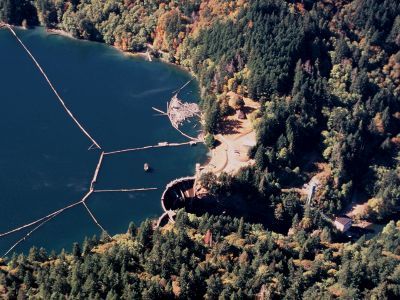 Glines Canyon Dam, Elwha River pre dam removal.3 |
Robert Lundahl: And we have just talked about the Elwha River and it seems as if the moment that we're in right now is very similar to 1910 or 12 when non-local capital came into the region, and investor interest did not take into account Native populations or community values and they promised something that they didn't deliver – they promised that they would put in fish ladders when the dam went in.
But they did not have the technological expertise to build those fish ladders. That precedent became the basis of the hatchery system in Washington. It didn't really take much to set a long-term precedent that affected many, many rivers and the trade-off is…
Michael Jackson: ...What has it been- 100 years now? Trading cheap energy for a sustainable resource, which is exactly what they want to do with the Pebble Mine in Bristol Bay and you cannot trade a sustainable resource for harvesting a resource that will run out and leave permanent pollution.
It's called “forever mitigation”; you have to mitigate that tailings pond forever, and once the money's gone out of the mine, what's the incentive for that mining company to maintain that mitigation, that “forever mitigation,” there is not...
Robert Lundahl: Dude, this is like all my films rolled up into one the way you're talking about it because, well, I went down to the Mojave Desert and they're building solar energy projects, or had been building them the last five ten years, meaning they're taking five to ten square miles of land per site, and grading it.
So there goes your ecosystem, there goes your carbon sink, there goes your biodiversity, there goes your people, there goes your Native landscape and your burials and villages and everything else, and they're breaking I don't know how many countless laws – seems to be an economic structure that is used, that is defeating environmental and community values in almost every turn in the United States.
Michael Jackson: It's environmental alcoholism. This time will be different.
Mark Titus, a good friend of mine created a film about the Pebble Mine called “The Wild,” and it chronicles his personal journey with substance abuse and how it parallels the ecological abuse, and how you bargain with yourself and how it's going to be different this time, and it never is.
It just never is. It's the same thing every time unless you decide to put a stop to it all.
Those fishermen in Bristol Bay, the local populations, the sports people that come in, everybody is fighting this mine. Nobody wants it except a foreign mining interest. And unfortunately the governor of the state of Alaska is resource driven and he is all for this mine. He is pulling out every stop he can.
Robert Lundahl: Well the lesson on the Elwha for me was that progress isn't always what we think it is, and what my historical consultant said was, “before science improved the river, you had entire communities deriving food stuffs from that river and surviving depressions and recessions, but after science improved the river, there was nothing in that river that would contribute toward a subsistence lifestyle.”
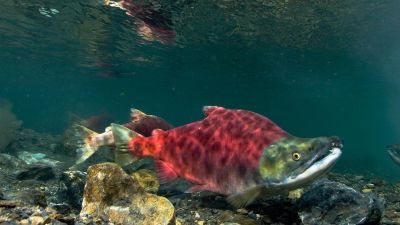 Two pink sockeye salmon swimming in different directions. |
Michael Jackson: Correct, yeah, I mean the Luddites weren't wrong – they weren't against anything, they were just warning that modernization was going to take away a way of life, and that's exactly what happens you're trading off a way of life for a perceived convenience, or perceived wealth, that's short-term and I'm, “no not only no, hell no!"
There's lots of, there's lots of me's. I'm a big guy. There are bigger guys than me and we are in the way and staying in the way.
Robert Lundahl: Can you tell me about the fisheries group where you are vice president and board member?
Michael Jackson: You bet, I'm a Board Member on the Bristol Bay Regional Seafood Development Association, which is a marketing association for all the Bristol Bay drift fleet.
There's 1800 well 1850 or so permits and we self-assess ourselves a one percent tax, and with that tax we take on marketing projects, we take on sustainability projects, such as studies on habitat restoration, run timing, we work on quality issues because we want to get the most value out of our fish so that our members can get the most return on their investment.
So it's a marketing organization that does more than just market, and in the past few years we've taken a very hard stand and put a lot of money into legal battles against the Pebble Mine because that's the number one concern for our members.
Robert Lundahl: I see, and you said, originally when we talked, that 85 percent of the membership is highly concerned about the mine – where do the other 15 percent come down? What are their perceived values? Are they pro–mining or pro–extraction in general? Or how do you characterize it?
Michael Jackson: I can't speak to them because I can't speak with them, because we're so far apart. I can't find a middle ground with them. The arguments that I've heard are Alaska is a resource extraction state, this is a resource, we need to extract it.
They don't read the science that I’ve read. They don't follow what's happening with the politics that's absolutely corrupting the project and so I think that they see the worth as more taxes into the coffers and more money, and for me, it's – there's not more money there's less money when you have to pay forever remediation you go backwards in a hurry.
Look at the state of Washington. Why do you think Senator Cantwell and Senator Murray are leading the fight against Pebble Mine?
They’re leading the fight, you know why? Because they've seen what happened in Washington with the mines. Habitat restoration costs millions and billions of dollars.
How about habitat protection? That costs nothing, but willpower. And that's what we need, is that willpower to keep fighting and get permanent protections for Bristol Bay.
Robert Lundahl: Well, it's wonderful that you have that clarity and unfortunately based on the lack of clarity in the past, and an awful lot of destruction.
What are, what do your sons think about this? I mean how is it different, or is it different at all for that generation, or is everybody sort of in lock step across generations?
Michael Jackson: They're against the mine. I don't want to speak to them as far as activism level because they they're not me they don't have that same personality, they are far more intelligent than I am but they're far less vocal. So how they help out is different than how I help out.
Robert Lundahl: Your interview is going to be seen in New York for starters and distributed outward from there, so we're talking about a group of people who sometimes don't have much exposure to the natural world and we've talked about the Elwha quite a lot.
What would you say to them as far as the relevance to their lives living in an urban environment and being farther away from a place like Washington or Oregon or Alaska, Montana...
Michael Jackson: You know that's a really good question because I've traveled throughout the country in the fight against Pebble Mine trying to make it relevant to people that you're describing that don't have that similar shared experience.
And I’m trying to get an emotional attachment with them so they can understand, so instead of me telling when I'm in front of people I'll ask what's important to them.
I'll ask what is it that that feeds your soul, and if I get a hand or two and trickle up and I'll go “what if you, what if that was threatened what if that was threatened forever and it didn't have to be?"
How does that make you feel? And that starts to get the lights going.
And the conversation could come up. So what I would tell people in New York City (See VIDEO below) is it's no different than if they decided that that Central Park really really really needed to be turned into a parking lot and it's – I'm sorry, I'm sorry but we know better... it's really important that we do this and the parking fees are going to go to this company that I own and you know I'm really sorry that's just the way it's going to be...
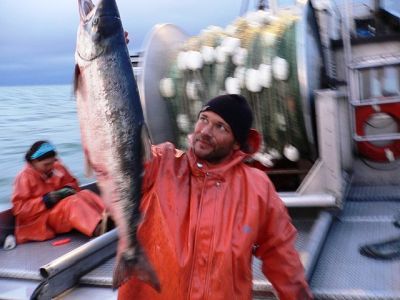 Sockeye harvested at Bristol Bay near Nushagak, on board |
Alaska is a resource extraction state and they're all about trying to get the worth out of the land in the waters, fishing, mining and logging. But there's certain elements within those different resource extractions that recognize that they need to make it generational and sustainable, and so some of the laws that have been enacted recently are gearing towards that.
It's not just take it and run, it's "hey look, we want to plant again, we want to keep fishing here," so I think there's an increasing awareness about the environmental stewardship.
I think the youthful generation like my sons and kids, their kids, young men and women their age, they recognize that that's where they fit in. It is shepherding that environmental stewardship and finding a voice for that.
Robert Lundahl: Wonderful, well they certainly have a highly motivating dad.
Michael Jackson: Motivation's one thing, intelligence and direction is another, so they've got the second two, I've got the first.
Robert Lundahl: Well you ran through a lot of things to think about. Can we digress or progress a little bit and give me just a slice uh of a description of a day in the life of a commercial fisherman in Bristol Bay?
Michael Jackson: Yeah okay so what we're allowed to fish, based on the biology of the run, we have area managers and they determine the maximum sustainable yield, so they'll see how many fish are in a river system at one time and they'll say, okay, there's ten thousand fish.
Of those ten thousand we need five thousand to get up the river so I figure if we open it for five hours, five thousand fish will get up the river and you guys can take the other five – so I'm gonna open it from five am till 10 a.m. okay? Ready go.
So for five hours we get to fish – and that's just an abstract number. That's not real and those numbers are not real, I'm just giving you an example of how it's managed based on biology and window openings to take advantage of our ability to take the maximum sustainable yield.
So you're fishing, and sometimes the fish are just in one area, a really small area and so you're all forced to compete in close quarters to get these fish because they don't line up and take numbers like at ice cream store.
They're trying to get up the stream to go do their jobs, and your job is to intercept them, so it can be absolutely crazy in and how quick things happen and how fast the fish move through so you have to have your gear properly maintained, you have to have your crew well fed, rested, right attitude, it's just everyone's operating at peak levels.
Robert Lundahl: I kind of like filmmaking, it’s six o'clock in the morning and you know you got so much light, and there's a client there, it rained pretty quickly and your talent's got a hair problem, and you know you got to make it happen.
Michael Jackson: You can't tell the fish “I'm tired, wait, I'll be back in four hours.”
It's like “Spinal Tap” – remember the movie Spinal Tap, when the amplifiers got 11, the guy goes well, why do you have 11? He goes “what, it's one more than ten enit?” And that's what Bristol Bay is like – it's always at 11. Everything's 11.
It's just extreme and so you have to be prepared for the extreme. Spare parts spare nets, plenty of food, and still things go crazy, and, and because things happen so quickly and, and because it's such a compressed fishery, if you have a breakdown or somebody gets hurt, one tenth of your year's earnings could be gone if you miss one day's fishing, so it's a crucible.
You really have to stay focused and be prepared and a lot of people are, they don't function well with that sort of thing. But I'm so old and I've done it so for so long that for me it's second nature.
That doesn't mean I don't get frustrated when things go sideways because I do and they do, but I try to anticipate as much as I can and have contingency plans in place, so it's a chess game, while you're doing battle, if that makes sense – it's a mental battle as much as it's a physical battle.
Robert Lundahl: Tell me about the sockeye themselves, I mean we went into that a little bit but they're really unique creatures and they come, they go away looking a little different than they come back and what is their life cycle?
Michael Jackson: That’s a good question. I was just on the phone with some biologists today. There's different ways they come back, like some of them will stay inside the river system for two years and then they'll go out in fresh water for one year and come back.
Some of them will go or go out in the ocean; some of them will stay in the fresh water for one year and then go on the ocean for three years.
So it's a three-four year cycle and they go out as a little fry and they come back as six to nine pound beautiful chrome blue backed amazing fish. Just, they're just... I just get chills thinking about it. They're just wonderful, wonderful species to be involved with.
They're vital, they're hearty and when they get into fresh water they start to lose that chromal color.
All of their energy now isn't going into feeding anymore, it's going into trying to go up to spawn and create the next generation.
So they'll start to lose their color, they'll start or they'll start to lose their chrome and they'll turn red and they'll develop a hump on their back and they uh they just kind of transform in front of you, and it's no different than a caterpillar turning into a butterfly. It's just as beautiful – different outcome. They don't fly they float.
Robert Lundahl: mm-hmm, well um I I've been there in places like the Brooks River, you know, and you see a run of salmon and they're usually followed by Brook Trout or something like that on some of the rivers so there's a bunch of species that kind of interoperate.
Michael Jackson: The same eggs you bet – symbiosis, yep.
Robert Lundahl: Can you just explain a little bit, like, what you see, what it looks like when everything's going off, you know?
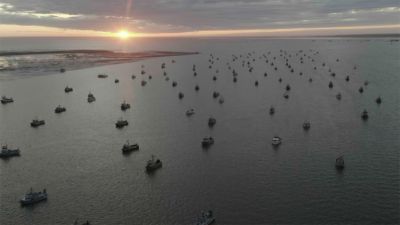 ButcherBox is Calling for Permanent Protection of Bristol Bay, |
The birds that flock in the light, and it's dark and then it's light, and at the same time you're seeing a whale jump, and then at the same time the seals are feeding along your net as the fish are jumping and the light’s absolutely amazing, it's just nature at its perfect height, it's everything is perfect as it should be.
How can we interrupt that? How can we change that?
Robert Lundahl: What does that do for your soul? Sometimes I ask you twice because there's a couple different ways to say it, you know, and you're really doing well and I love the emotion that you have about it, and the description.
I mean, you read the great nature writers and they're talking about, you know, it's the feeling of the participation and the understanding of things and I think that's just wonderful about what you're saying.
Michael Jackson: It's just an agreement. I agree to respect the area. It nourishes me.
Robert Lundahl: How long are you going to keep doing it?
Michael Jackson: I have a 13-year-old son. I'm dying with my boots on, so I can't quit.
Robert Lundahl: How old are you now?
Michael Jackson: Uh dog years or human years? 59.
Robert Lundahl: You're a little younger than I am so we've had a lot of the same view of land and changes and things like that.
Michael Jackson: Yeah no... I mean, I'm not gonna apologize for being emotional. It's a special spot, and I wish people could just feel what I get to feel for two and a half months a year, just for a day, just for a day to understand why people do this and go there. It’s just – I am just honored to be there.
Robert Lundahl: Gosh you know, I don't know what more to ask you, I mean you just gave me your heart and soul so…
Michael Jackson: It's not really about information, you know, necessarily, it's a very emotional time. The record of decision by the Army Corps of Engineers is due out any day and it's a thumbs up or thumbs down whether the mine gets the permit. And it's been such a corrupt system we are all just on pins and needles right now, all of us.
Robert Lundahl: Well, I was going to ask you about that, so that's the one question I didn't ask you. What's going to happen because you mentioned any day Army Corps is going to approve or disapprove.
If they approve is that the end of the decision making or does that mean it's okay to just go ahead and put it into you know contract or construction or however?
Michael Jackson: It's the first step of getting the spades into the ground and starting to turn the soil and what it gives them is the right to go out and find investors, which is all they want.
They're just trying to get the money to pump it up and dump it out. They're not going to develop this. They have no financial way to develop this mine, but it gives them their, it gives them their golden ticket then they're out.
Robert Lundahl: How do they just, how do they get the billions on the basis of a PowerPoint?
Michael Jackson: Well, it's called forward-looking statements. Everything that they do, they're not responsible for factually, because they preface it with “this is a forward-looking statement.” I just I mean this is a sci-fi movie.
Robert Lundahl: Yeah, um so does it really fall in the lap of the White House and our current president? Is there any thought of executive order moving this forward or approval in the interim between the new administration? Or how is that political reality affecting us?
Michael Jackson: That's a good question. We had discussions about that today with a lawyer, and the thought is the record of decision – they might hold off on the record of decision until the Biden administration comes in because if they issue it now, with the Trump administration who leans heavily towards the mine development and the Biden administration comes in he can change that, so it would just be a whole waste of time and energy and a big public – well it would be a scene.
We would like it to be a scene. I'd rather not have it, but what they're trying to do is balance what they get long-term versus the short-term benefits, and I think the Pebble Mine would rather not have it in the news right now because it's not popular.
So I think that what probably is going to happen is they're going to wait till after Biden comes in. And then they'll probably, I'm hoping, probably deny the permit and then it goes to lawyerland. So we don't have permanent protections, we've got short-term protections with the Clean Water Act that we can go after. We're trying to get permanent protections.
Robert Lundahl: So why is it that you think the Army Corps will deny it?
Michael Jackson: Did you see or have you heard of the Pebble Tapes? A series of 13 tapes by investors that, or by investigators that that posed as investors. Did you happen to see those?
Robert Lundahl: It was in the New York Times this morning.
Michael Jackson: Okay, absolutely damning, absolutely incriminating, every single thing that the Pebble Limited Partnership and Northern Dynasty said is out in the open. They say one thing they do another, and so that, that's a big thing – they don't want to see that out in public.
They don't want to admit that actually happened, they had a fall guy take off, Tom Collier, and they brought it back up but right now I think if they try to push it through with the Pebble Tapes out in front and with the DeFazio investigation now based on the false claims to Congress there's no benefit.
I think that they can just fade back into the background a little bit and they'll take that no and then they'll keep fighting. They'll go to lawyerland and keep fighting.
Robert Lundahl: Do you have any information, any inside information on their activities or plans, I mean, are there, you know, mutual friends they happen to go drinking with or anything? Or is it is it pretty much...
Michael Jackson: I have, no, I have absolutely no, no inside information. I've done, I've worked on the other side of that fence. I don't want to go near it, so I work with lawyers. I work with other activists, and all we can do is work from conjecture and best guesses, so we have no inside knowledge.
Robert Lundahl: Where did the money come from?
Michael Jackson Well, interesting question. There were a number of initial investors Rio Tinto, First Quantum, a number of large mining companies, and they've all looked at it, they heard from the Natives and they walked away, so 500 million dollars here, 250 million dollars there, were put up and they said – the bigger mining companies said “yeah this isn't gonna work we've done this enough we made a mistake.”
That's where the money came from, so right now they're trying to find money wherever they can. They're turning over every rock they can to try and find 10 million here, 20 million there, just to keep it pumped up enough to sell that permit if they get it.
Robert Lundahl: Well, you mentioned they have no skill at developing a mine and they have no money to do it either. So it's a blatant pump and dump scheme. You mentioned Rio Tinto and they don't have the best ethical or environmental track record or human rights track record either.
Michael Jackson: No they don't read, but at least they walked away.
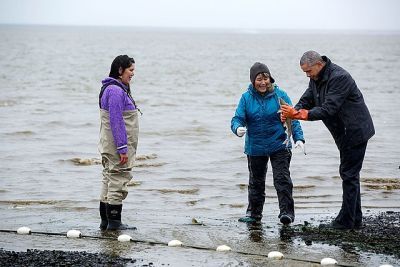 Barack Obama with salmon fisherwomen in Bristol Bay, Alaska4 |
Michael Jackson: Yeah, even the black hats are turning around.
Robert Lundahl: So what are the mechanisms by which, theoretically it would all be approved and they get everything they wanted?
Michael Jackson: Are you asking me what the worst-case scenario is? Is that what you just asked?
They get the permit, they win the court fight, and they put the mine in and then they turn the Pebble Mine into a mining district.
Right now they've got 3,000 acres that they want to exploit. But once they put the roads in then they can keep leap–frogging it up throughout the whole watershed and it would it would take away all of the Alaska subsistence, would take away the Native way of life, take away the commercial fishing, and remember, I'm Vice President for a marketing firm for our fish.
Our marketing involves sustainability, pristine habitat. The minute we have any kind of anything, all of our marketing is gone, everything, it's complete. Our valuation of our fishery drops in half at best, so it's a real threat on a number of levels.
Robert Lundahl: We don't have to wait 10 or 15 years to start seeing impacts in the ocean to the fish and the levels of fish dropping and those kinds of things? Which I presume would take a little a little bit of time...
Michael Jackson: I think you would have to wait some time, honestly, to see some direct effects on the fish from the tailing dams, but it doesn't mean it wouldn't directly affect our market price and our marketability. So there goes your industry.
The damage is done, economically, not necessarily environmentally, but the original damage is to come. It's like just taking the hose on the sand castle and taking out the footings and just taking us out from below, exactly.
Robert Lundahl: So what we have here is like what happened on the Elwha too. You had the investors wanting to put in dams to create power for one, for one destination, which was the Bremerton Navy Yard.
And they sacrificed everything for that, so basically that also impacted the commercial fishery, which was lively, and was tribal, and non-tribal at that time and it was a case of one industry really battling another industry.
Michael Jackson: Yeah it's "trade-offs." It’s another instance of environmental alcoholism. "It'll be different" but it won't, it never will be, and like I mentioned earlier I just think that you really need to decide to take a stand on something in your life.
If you are a human being, you have passion, and you need to exercise that passion in a positive way and I and I've done it on a number of levels for different things but this is the fight of my life right now because of the people that I've been involved with.
Because of the land I've been able to make a living with, it's the fight of my life and I'd like for your listeners and your viewers to feel that and to help out as much as they can and to write to their senators and their Congress people and say “hey I just heard this lunatic talking about this place that seems crazy to develop, how can this happen?”
So I'm asking for help. I'm asking for help from people all the way across the country and I don't care if you're a Democrat, I don't care if you're a Republican, I don't care what you are.
You're an American and this is a travesty of American justice to have a foreign mine company come in and exploit that resource, ruin a pristine habitat and ecosystem, and then walk away with “forever mitigation” costs put upon a land that they just ruined. I need help.
WATCH VIDEOS BELOW:
Photo Credits: 1Robert Lundahl, for the National Park Service; 2Robert Lundahl, Unconquering the Last Frontier, Bullfrog Films; 3Robert Lundahl for the National Park Service; 4The White House; 5Härmägeddon; 6Milton Love, Marine Science Institute, University of California, Santa Barbara, USGS; 7justcook.butcherbox.com.
 Michael Jackson is a commercial fisherman, who has built a life on the waters of Bristol Bay, Alaska, after beginning his career in Tacoma, WA 43-years ago.
Michael Jackson is a commercial fisherman, who has built a life on the waters of Bristol Bay, Alaska, after beginning his career in Tacoma, WA 43-years ago.
Articles for July 26, 2022 | Articles for July 27, 2022



Quick Links
DINING
Willamette UniversityGoudy Commons Cafe
Dine on the Queen
Willamette Queen Sternwheeler
MUST SEE SALEM
Oregon Capitol ToursCapitol History Gateway
Willamette River Ride
Willamette Queen Sternwheeler
Historic Home Tours:
Deepwood Museum
The Bush House
Gaiety Hollow Garden
AUCTIONS - APPRAISALS
Auction Masters & AppraisalsCONSTRUCTION SERVICES
Roofing and ContractingSheridan, Ore.
ONLINE SHOPPING
Special Occasion DressesAdvertise with Salem-News
Contact:AdSales@Salem-News.com

Terms of Service | Privacy Policy
All comments and messages are approved by people and self promotional links or unacceptable comments are denied.
[Return to Top]
©2025 Salem-News.com. All opinions expressed in this article are those of the author and do not necessarily reflect those of Salem-News.com.